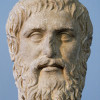“ But the virtue which is founded on habit is not sufficient to enable a man to choose ”
Plato, The Republic. copy citation
| Author | Plato |
|---|---|
| Source | The Republic |
| Topic | virtue habit |
| Date | |
| Language | English |
| Reference | |
| Note | Translated by Benjamin Jowett |
| Weblink | http://www.gutenberg.org/files/1497/1497-h/1497-h.htm |
Context
“He who was moderately fortunate in the number of the lot—even the very last comer—might have a good life if he chose with wisdom. And as Plato does not like to make an assertion which is unproven, he more than confirms this statement a few sentences afterwards by the example of Odysseus, who chose last. But the virtue which is founded on habit is not sufficient to enable a man to choose; he must add to virtue knowledge, if he is to act rightly when placed in new circumstances. The routine of good actions and good habits is an inferior sort of goodness; and, as Coleridge says, 'Common sense is intolerable which is not based on metaphysics,' so Plato would have said, 'Habit is worthless which is not based upon philosophy.'”
source



